
Has it ever happened to you that when you smell or taste something, a random memory, like an event in our life, comes to our mind and it suddenly brings back many emotions with it? Why and how does this happen? Well, as each day goes by, a new memory is made, whether it’s related to an emotion or just a fact. However, as we also grow older, we begin to forget many things. Whenever we try to remember a specific point in our life or story, this memory may be a bit “hazy”, meaning that it is hard to remember in full detail what may or may not have happened during that time. But why are we able to remember something so simple instead of something more significant? Why does our brain get to “choose” what it can or can’t retain? Believe it or not, the one who is actually making those decisions is us, partially. Our brain works in very interesting, yet complex ways. However, everything has a reason, from the way the brain is structured, to the way it functions. Although, each thing that we learn and remember might not always be processed and stored by the same neural hardware.
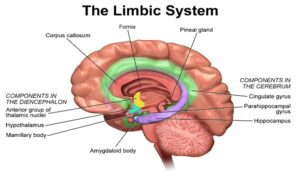
One of the main regions in the brain that plays an essential part in storing our memory is the limbic system. As the University of Queensland defines it, “it is the part of the brain involved in our behavioral and emotional responses.”1 The limbic system contains several important structures, such as, the amygdala, hippocampus, thalamus, hypothalamus, basal ganglia, and cingulate gyrus.2
In order for a new memory to be made, a signal arrives. The information goes through an action of synapses, where it connects a group of neurons and generates an action potential in response to a signal. Memories are initially stored in the prefrontal cortex and then in the hippocampus, which is located in the brain’s temporal lobe. Through these synapses, it will begin to form new circuits within seconds of the events, in order to be remembered. Here is where the human brain can reshape itself with each new memory. However, our memory must go through 3 different stages to retain this information: Sensory Memory, which is the capacity to briefly retain large amounts of information that we encounter daily; then comes Short-Term Memory (STM), which retains pieces of information for a relatively short time (usually 15-30 seconds) and then it is selectively converted into a permanent process called Memory Consolidation. This process then finally becomes a Long-Term Memory (LTM), which stores and recalls memories for days, months and years.3 Therefore, in more simpler words, when a memory is created, it will first be retained in the Prefrontal Cortex for a short period of time, however for this memory to become “permanent”, it will need to go through a process of repetition. For example, riding a bike. The first time you ride a bike it will create a new synaptic connection between two neurons. As you keep practicing, this signal will continue to synapse and send a flare, that will keep these neurons permanently connected and it will become a Long-Term Memory in the hippocampus.4
It is also essential to emphasize that there are two types of Long-Term Memory, which are: Declarative (explicit) memories, which involve the hippocampus, the neocortex, and the amygdala. These types of memories can just as easily be created as can be forgotten they’re mainly used to retrieve a specific memory about events and facts, such as, what you had for lunch, or the capital of a country and they are considered a “conscious” effort. The other type is Reflective (Implicit) memories, and they rely on the basal ganglia and cerebellum. They refer to the influence of experience and it does not require a conscious process, it involves things such as skills, habits and behaviors.5
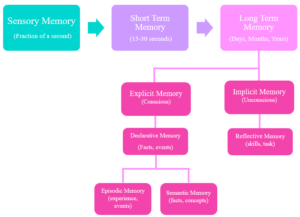
All these processes are mainly occurring all at once. However, you may be wondering how this all ties in with our emotion. According to the Encyclopedia Britannica, “emotion is a complex experience of consciousness, bodily sensation, and behavior that reflects the personal significance of a thing, an event, or a state of affairs.”6 There are an enormous range of emotions, and even within the same emotions there are still a considerable number of variations. The way we react to a specific event or situation can affect how involved we are with what happened and how well we will recall it later. In other words, as Kensinger and Schacter (2008) describes “emotion can influence the quantity of information, the quality with which it is remember and the type of details that one can remember about prior events.” Therefore, emotions play a key role in memory processes, because as mentioned before, the limbic system is involved with behavioral and emotional responses as well as with memory. This is a clear view of how emotion and memory occur via direct interactions. A variety of studies have shown that emotion can either boost or impair learning and long-term memory (LTM) retention, depending on a range of factors that may be presented during a situation.7
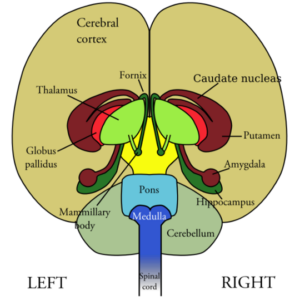
Within the limbic system, each area has a crucial part in the function and control of emotions. The hypothalamus controls emotional responses, as well as sexual responses, hormone release, and body temperature regulation. While the hippocampus helps preserve and retrieve memories. The cingulate gyrus and the parahippocampal gyrus, which work together, impact mood, motivation, and judgment. Finally, the most important area for emotion is the amygdala, which helps coordinate responses to things in your environment, especially those that trigger an emotional response. It also has an important role in fear and anger. This will be seen when presented with a strong emotion during a situation and it can either enhance or suppress your memory of that event. For example, let’s say you take the same road to work every day. However, one day you get into a car crash. During this experience, there are two “memories” being created. The first one is a conscious memory about the event of what just happened, where you were, and even who you were with. At the same time, the second memory is being created, where the amygdala, as well as other subcortical systems, are forming an Implicit (unconscious) memory that connects the emotions you’re feeling at the moment of the accident, like fear and pain with the stimuli that is also present. Therefore, the memory you had before of the regular road to go to work, is now saved as a “newer” memory associated with the emotions you felt at that time. When you drive through that road again, the conscious memory will be reactivated and so will the amygdala, which according to Neuroscientist Joseph E. LeDoux, it will “release hormones, brain and body arousal and it will amplify the cognitive, conscious memory making it stronger for next time.”8As a consequence, you will be experiencing the feelings you felt during the accident, such as fear and pain will intensify every time you drive through that road again.
However, if we go back to our initial question, on why we remember a story or moment in our life vaguely. It will be mainly influenced by our emotions, which are known to affect the details we store in our memory. For instance, in an arousal state, our brain will focus its attention to only the most important stimuli that you are surrounded by. Details get prioritized if they are easy to perceive, involved with a strong emotion and if they require a fast response in determining how to act on something. These are key points you will remember after a situation occurs because again, “you don’t remember what you don’t notice.” Memories attached with an emotional event are often more vivid and accurate than those of daily, neutral experiences. In other words, we probably remember more details about when we adopted our first pet, than the first time we tied our shoes. The reason behind this is because our amygdala and hippocampus are activated at almost the exact same time, where the emotion-focused amygdala helps the hippocampus store memories more effectively and it results in stronger memories. Many other factors of emotion play a role in memory, such as stress and even our own perspective towards something.9
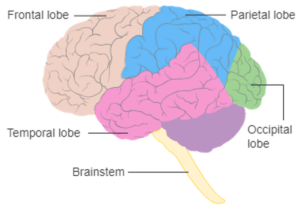
Now that we understand how emotion and memory goes hand-in-hand. Aging is also a key factor in this topic, and it may affect these processes. Our brains are in a constant transformation throughout our lives and as we age, so does our brain, and it will begin to “shrink” around our 30s. Due to this, some functions in our brain will be altered, affecting a variety of functions, such as, white matter, our neurotransmitter systems, our cortical density, but especially our brain mass. Other functions that can be affected are memory storage, processing speed, and spatial awareness deterioration. Two main regions of the brain that decrease significantly more than others are the frontal lobe and the hippocampus (temporal lobe) these areas of the brain are responsible for cognitive functions. The frontal lobes are considered to be the human behavior and emotional control centers for our personalities, while the hippocampus, as mentioned throughout the article, plays a major role in learning and memory. Many studies have shown that a decrease in the hippocampus can lead to a series of neurological diseases.10 It has also been studied that older adults, in comparison to younger adults, remember more emotional than emotionless information. Some findings have suggested that the emotional memory is not only maintained but enhanced in older adults. Meaning that at an older age, the cognitive memories are the ones that decline in comparison to those memories that are attached to an emotion. Our cognitive memories are “lost” due to aging, when the hippocampus, as well as some hormones and proteins that are in charge of protecting and repairing brain cells, decline the neural growth. On the contrast, it has been shown that older adults often experience a decrease in blood flow to the brain, which can impair memory and lead to changes in cognitive skills.11
It’s essential to emphasize as well that age-associated memory impairment is considered to be a “normal” part of aging and it doesn’t mean you have dementia. Many confuse memory loss with having a neurological disease, which is not always the case. When your memory loss is considered severe is when it begins to affect your daily life and ability to stick to your normal routine, as well as finding it difficult to learn new things and complete tasks you’re normally familiar with. Therefore, it is key to know the difference between normal aging and dementia.
Overall, emotion and memory are two main processes that work together throughout our whole life. It takes steps, stages and repetition in order to keep a memory alive. However, those memories that are attached to an emotion, enhancing its ability to become a strong memory due to the chemical reactions it produces in our brain. As we age, our brain mass decreases, which affects significantly our cognitive memories, but the emotional memories remain intact, it even intensifies. For that reason, it is important to always try to exercise our cognitive brain. Practicing mental exercises twice a week can make our brain work better and have a lower risk of our mental health declining once we get older. Ways to reinforce your brain to improve and prevent memory loss at an older age include, doing puzzles, quizzes, card games, reading more, you can also try using acronyms, abbreviations, and mnemonics as a trick for memory retention, reducing stress and maintaining a healthy diet is a major factor too.12
Therefore, after understanding the correlation between memory and emotion, as well as how they are affected over time, it is essential to try our best to “preserve” our memory as much as we can. Even staying positive, finding happiness and being grateful is a way to keep your brain healthy. On the other hand, in order to retain a memory, it requires constant repetition. Meaning that if you’re learning how to ride a bike or drive, it is key for you to consistently practice in order for your neurons to continuously synapse and keep the connection alive and turn it into LTM. But if there’s a specific moment in your life that you also want to remember, it’ll be easier to recall it if it is associated with an emotion, specifically one that you are feeling during that time. In other words, your first kiss will be a more vivid memory than the first time you brushed your teeth by yourself.
- Where are memories stored in the brain? Queensland Brain Institute – University of Queensland. (2018, July 23). Retrieved from https://qbi.uq.edu.au/brain-basics/memory/where-are-memories-stored. ↵
- Physiopedia contributors. (2021, January 2). Limbic system. Physiopedia. Retrieved from https://www.physio-pedia.com/Limbic_System#:~:text=There%20are%20several%20important%20structures,%2C%20amphibians%2C%20reptiles%20and%20mammals. ↵
- Camina, E., & Güell, F. (2017, June 19). The neuroanatomical, neurophysiological and psychological basis of memory: Current models and their origins. Frontiers. Retrieved from https://www.frontiersin.org/articles/10.3389/fphar.2017.00438/full. ↵
- Kennedy, M. B. (2013, December 30). Synaptic signaling in learning and memory. Cold Spring Harbor perspectives in biology. Retrieved from https://www.ncbi.nlm.nih.gov/pmc/articles/PMC4743082/#:~:text=Memories%20are%20stored%20initially%20in,that%20stores%20a%20new%20memory. ↵
- Stangor, C., & Walinga, J. (2014, October 17). 9.1 memories as types and stages. Introduction to Psychology 1st Canadian Edition. Retrieved from https://opentextbc.ca/introductiontopsychology/chapter/8-1-memories-as-types-and-stages/. ↵
- Solomon, R. C. (2022, October 27). emotion. Encyclopedia Britannica. https://www.britannica.com/science/emotion. ↵
- Kensinger, E. A. (2009). Emotional memory across the adult lifespan. Psychological. ↵
- LeDoux, J. E. (2017, November 9). What is the role of emotion in memory? YouTube. Retrieved from https://www.youtube.com/watch?v=iLzFa-aiDmc. ↵
- Swaim, E. (2022, July 10). How do emotions affect your memories? Healthline. Retrieved from https://www.healthline.com/health/mental-health/how-does-emotion-impact-memory#why-it-matters. ↵
- Bear, C. (2007). Neuroscience: Exploring the brain. Lippincott Williams & Wilkins. ↵
- Prvulovic, T. (2022, April 18). Memory and aging – 7 ways to improve your memory. Second Wind Movement. Retrieved from https://secondwindmovement.com/memory-and-aging/. ↵
- Changes that occur to the aging brain: What happens when we get older. Columbia University’s Mailman School of Public Health. (2021, June 10). Retrieved, from https://www.publichealth.columbia.edu/public-health-now/news/changes-occur-aging-brain-what-happens-when-we-get-older#:~:text=By%20the%20age%20of%206,even%20more%20by%20age%2060. ↵
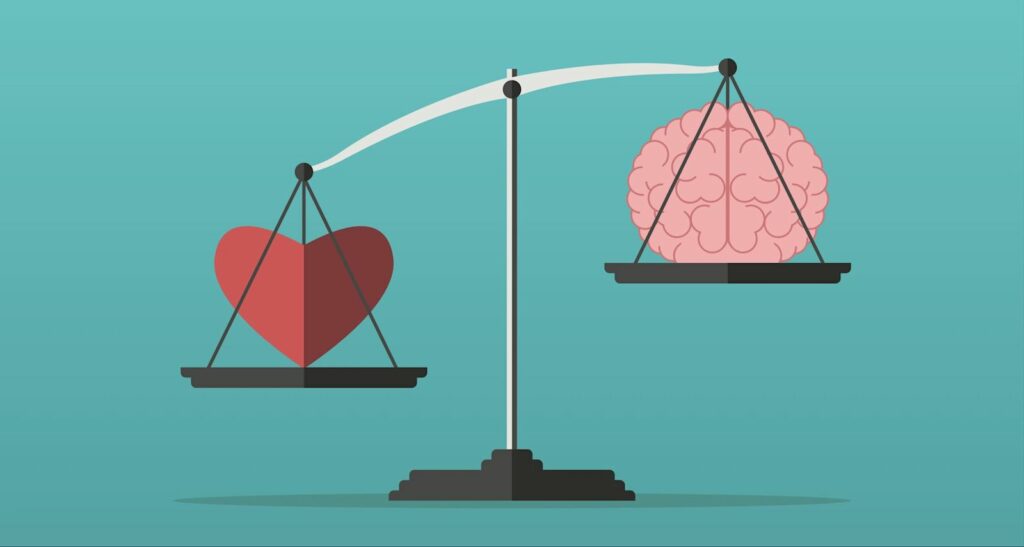

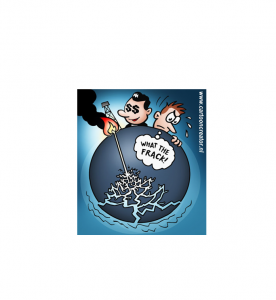

25 comments
Carlos Alonzo
Congratulations on receiving your reward! Your article was informative, and I especially liked how it explains memory. Hopefully, you will continue to learn and become a neurosurgeon. I liked the example you have included regarding car crashes. Interestingly, brain damage and symptoms such as memory loss are considered TBI (Traumatic Brain Injury) and cost lots of money to treat and remedy.
Kristen Leary
What an interesting topic! You clearly did a lot of deep research in order to produce such a high quality article. The connection of senses to memories has always been something I wondered about, like how the smell of a certain food can make you feel nostalgic. Well done on the article and congratulations on the award nomination.
Jared Sherer
It is interesting how our brain works. I learned a lot about how our brain can use certain memories as a core memory and how certain things could bring back old memories. Your article was well written and very informative. I enjoyed the detail that you provided in your article, and I think it is interesting how we can bring complex ideas into our memory. Your article was very interesting to read and I learned a lot from it.
Isabel Soto
This article was filled with a lot of new information to me like In older adults the emotional memory is maintained and enhanced in older adults. So, the cognitive and the rational memory is declining but the emotional memory in getting good.One quote that I always will remember is “people will not remember what you say, but they all remember how you made them feel,” which is exactly what this article proves. It’s beyond intriguing to understand the complexities of the brain but more importantly how you were able to tie such complex processes together.
Andrea Tapia
Hi Maria, congratulations on getting your article published! This article covered a lot about memory that I never really knew much about. It is so impressive how memory works, especially when we spell a scent we are able to remember things that had happened in the past. Especially knowing that our own emotions can affect the way we may remember things. I love being able to remember things so when I don’t it’s hard to remember what had happened in my life. It was nice to see more article like this and the process that go with memories.
Melanie Fraire
This article was very interesting to read and informative as well. I really enjoyed the topic chosen and the information presented. Overall, a very good article, and congratulations on your nomination it is very well deserved!
Madison Magaro
Congratulations on your nomination and for writing a great article Maria! Memories are so important in a persons life and can help shape them into the person that they are. I would never put together smell and taste with memory, but this article made that make sense. Overall this was a very interesting article and you did a great job at finding your information and putting it together.
Bianca Ramos
Congratulations on being nominated! This was an enlightening read and shed light on how memory functions. I’ve noticed before that memories with intense emotions associated with them (either positive or negative) did make bigger impressions than other ones, and it was really cool learning how exactly that process works! Your explanations and writing made perfect sense to me, so kudos!
Hailey Koch
Congrats on the nomination for your article, it was very informative and I enjoyed reading it. Memories are so important to me especially when a certain item or smell takes me back to something. I never knew where memories were located and how everything connected to one another. The limbic system seems to be a very important part of the brain. As memories are stored there it automatically becomes something very important to remember.
Matthew Holland
Quite an interesting article, I very much enjoyed reading this and hope that there are more articles about this in the future. It was nice of the author to explain in such great detail how these different emotions affect one’s memory. I will be looking for more articles by this person in the future as this is such an interesting field of study for me.